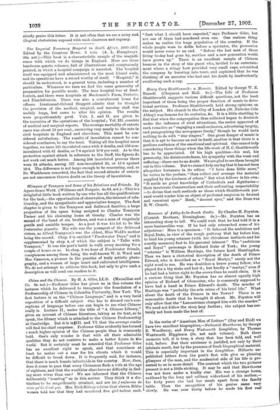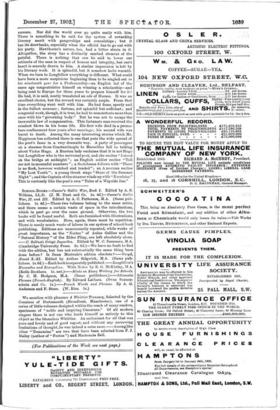In the series of "American Men of Letters" (Gay and
Bird) we have two excellent biographies,—Nathaniel Hawthorne, by George E. Woodberry, and Henry Wadsworth Longfellow, by Thomas Wentworth Higginson (5s. net each volume). Both these memoirs tell, it is true, a story that has been told, and well told, before. But their existence is justified, not only by their intrinsic merit, but by the presence of fresh biographical materiaL This is especially important in the Longfellow. Hitherto un- published letters from the poet's first wife give us pleasing glimpses of the man, and the academical side of his life is pre- sented to us in more detail. The contrast which the two pictures present is not a little striking. It may be said that Hawthorne was not born under a kindly star. His was a strange home, saddened by the long and solitary widowhood of his mother,— for forty years she had her meals apart from the family table. Then the recognition of his genius came very slowly. He was over thirty before he made his first real success. Nor did the world ever go quite easily with him. There is something to be said for the system of rewarding literary merit with gaugerships and consulships; but it has its drawbacks, especially when the official has to go out with his party. Hawthorne's nature, too, had a bitter strain in it. Altogether, the story has a distinctly marked element of the painful. There is nothing that can be said to lower our estimate of the man in respect of honour and integrity, but one's heart is scarcely drawn to him. A similar impression is left by his literary work. It is splendid, but it somehow lacks warmth. When we turn to Longfellow everything is different. What could have been a more auspicious beginning than to be singled out in his nineteenth year for a Professorship—an English lad of the same age congratulates himself on winning a scholarship—and being sent to Europe for three years to prepare himself for it ? He had, it is said, neatly translated an ode of Horace. It was an excellent choice, but the reward was certainly ample. From that time everything went well with him. He had fame, speedy and in the fullest measure ; fortune, not splendid but sufficient; and congenial work, though, it is true, he had to remonstrate more than once with his "governing body." But he was not to escape the inexorable law of compensation. This fortunate man received the cruelest blows in his home life. His first wife died in a prema- ture confinement four years after marriage ; his second wife was burnt to death. Among the many interesting stories which Mr. Higginson has collected there is one that puts the wide spread of the poet's fame in a very dramatic way. A party of passengers on a steamer from Constantinople to Marseilles fall to talking about Victor Hugo. A Russian lady exclaims that it is not Hugo but Longfellow who is the universal poet, and she recites "I stood on the bridge at midnight " ; an English soldier recites "Tell me not in mournful numbers "; a Scotchman follows with "There is no flock, however watched and tended" ; an A merican recites "My Lost Youth" ; a young Greek sings "Stars of the Summer Night " ; and the Captain of the steamer winds up with " E xcelsior." This is curiously like the poet's own "Tales of a Wayside Inn."







































 Previous page
Previous page